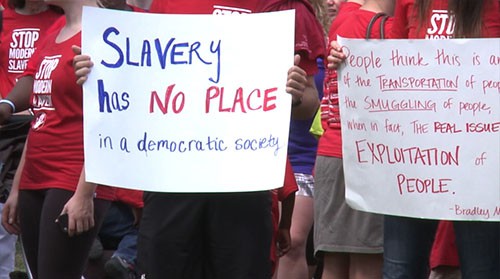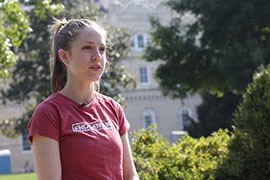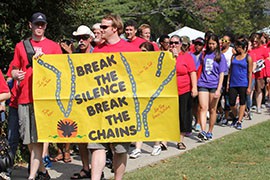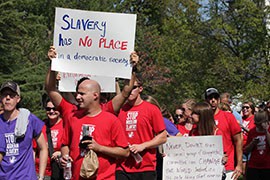Cronkite News has moved to a new home at cronkitenews.azpbs.org. Use this site to search archives from 2011 to May 2015. You can search the new site for current stories.
Advocates say fixing ‘age loophole’ in child prostitution is a priority
WASHINGTON – Someone who solicits sex with a minor in Arizona could face up to 27 years in prison. Or 90 days.
It’s what advocates call the “age loophole” and they say changing it is a priority.
“A minor is a minor, and if someone is going to buy sex with a child, they should be punished accordingly, not only a few months in jail,” said Taryn Offenbacher.
Offenbacher, a spokeswoman for Shared Hope International, joined hundreds of others rallying in Washington last weekend against sex trafficking. An Arizona native whose research focuses on the state, she said the issue is “incredibly relevant and timely” now, with the recent recommendations by the Governor’s Task Force on Human Trafficking.
And there’s urgency, advocates say, to make changes before Glendale hosts the 2015 Super Bowl, since the task force said sporting events like that are “significant drivers in the commercial sex industry.”
Few experts, including those on the task force, can put a number to the problem of sex trafficking, since it is an underground activity and victims rarely come forward. When they are caught, trafficking victims are often treated like criminals, the task force said.
It noted that while some estimates say there may be as many as 27 million human trafficking victims worldwide, only 40,000 victims were identified in 2012.
Norma Salas, public awareness manager of StreetLightUSA, estimated that 300,000 children are currently at risk of being sexually exploited in the country.
One factor that makes it hard to count victims is the fact that many are unidentified or misidentified, Offenbacher said.
“Victims are often identified as run-away youth, juvenile delinquents, and they are not identified for the trafficking crimes that occurred against them,” Offenbacher said. They end up in homeless youth shelters and juvenile detention centers for crimes like theft or drunkenness, which she said are really “only symptoms of their trafficking experience.”
While those children and adolescents are victims, they can still be arrested for prostitution, jailed and charged in most states.
The task force report listed 27 recommendations, including better police training, erasing low-level crimes from a trafficking victim’s record and increasing penalties against traffickers and their customers – “pimps” and “johns.”
It also recommended doing away with the current distinction in state law between sex trafficking “victims who are under 15 and those who are 15, 16 and 17 years old” – the age loophole.
Under state law, a john who solicits sex with someone who is 14 or younger faces 13 to 27 years behind bars. If john knew the child was 15, 16 or 17 years old, the sentence ranges from seven to 21 years – but only if prosecutors can prove the john was aware of the prostitute’s age.
Without proof of that knowledge, the minimum sentence falls to 180 days for soliciting a prostitute who is 15 or older, according to Jerry Cobb, spokesman for the Maricopa County Attorney’s Office. A judge could further reduce the sentence to 90 days if it was a first-time offense and the john agreed to court-ordered education or treatment.
Salas said one problem with the age loophole is that the average age of trafficking victims that StreetLightUSA sees is 15.9 years. “A lot of our victims would not fall into that protected status,” said Salas, whose Peoria, Ariz.-based organization describes itself as the largest facility for child sex trafficking victims in the country.
Dominique Roe-Sepowitz, director of Arizona State University’s Office of Sex Trafficking Intervention Research, called the age gap “the most blatantly egregious problem” in the law. The gap is not only hard for people to understand, but it does not make Arizona safe for young trafficking victims.
Advocates were cautiously optimistic about the task force, noting that its recommendations still have to go through the legislature, which has not always been amenable to changes in child prostitution law.
Roe-Sepowitz was pleased to see the task force recommend that the state consider erasing minor criminal convictions from a trafficking victims record, if those crimes came as a result of their victimization.
“They (trafficking victims) should have a good life. With felony history, it is so difficult for the victims to get an apartment or get a job,” said Roe-Sepowitz.
Offenbacher said she looks forward to seeing more detail on issues raised in the report, like increased penalties for johns.
“It says ‘enhance penalties for buyers,’ which is something we all know needs to happen, but what exactly do we need to enhance?” she asked. “Is it a prison time, is it a fine, and how do we actually go forward and make sure those sentencing guidelines are used for buyers?”
She said there is work to be done.
“The next step now is to look at the legislation, and bring that up to match the effort that NGO (non-governmental organization) groups, law enforcement and other key stakeholders in Arizona have been exerting to combat the issue,” Offenbacher said.











